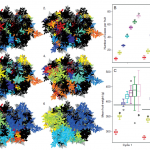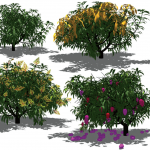V-Mango
Frédéric Boudon (CIRAD)
Overview
| Model category | FSPM |
|---|---|
| Plant part | Shoot |
| Scale | Organs, Whole_plant |
| Licence | open_source |
| Operating system | Any |
| Programming language | Cpp, Python, R |
| Format of model inputs and outputs | Text file |
| Species studied | Mango trees |
| Execution environment | Console, Stand-alone application |
| Modelling environment | L-Py |
Scientific article
V-Mango: a functional–structural model of mango tree growth, development and fruit productionFrédéric Boudon, Séverine Persello, Alexandra Jestin, Anne-Sarah Briand, Isabelle Grechi, Pierre Fernique, Yann Guédon, Mathieu Léchaudel, Pierre-Éric Lauri, Frédéric NormandAnnals of Botany, 2020 View paper
Model description
A model of architectural development that precisely characterize the intricate developmental processes of the mango tree. The appearance of botanical entities was decomposed into elementary stochastic events describing occurrence, intensity and timing of development. These events were determined by structural (position and fate of botanical entities) and temporal (appearance dates) factors. Daily growth and development of growth units and inflorescences were modelled using empirical distributions and thermal time. Fruit growth was determined using an ecophysiological model that simulated carbon- and water-related processes at the fruiting branch scale
Some case studies
The model simulates the dynamics of the population of growth units, inflorescences and fruits at the tree scale during a growing cycle. Modelling the effects of structural and temporal factors makes it possible to simulate satisfactorily the complex interplays between vegetative and reproductive development. The model allowed the characterization of the susceptibility of mango tree to pests and the investigation of the influence of tree architecture on fruit growth.

